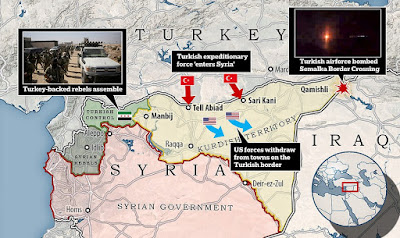Douglas V. Gibbs
Author, Speaker, Instructor, Radio Host
Donald J. Trump campaigned in 2016 that he would pull American troops out of regional conflicts where there are no direct influences on American interests. He is now, as Commander in Chief, acting upon that promise by verbalizing he plans to pull the small number of troops we have in northeast Syria out of the area. American military personnel have already been relocated away from the country’s border with Turkey, and are currently being transported to locations away from Kurdish strongholds.
The Kurds have been allies in the war against terrorism, be it al qaeda or ISIS, and because of their less than extreme position on Islam they are considered to be enemies to the more radical followers of Islam. We, as a country, in the past have told the Kurds that we will be there for them. We will be their ally. We will stand by them in this fight. For some, Trump’s withdrawal from the area is being seen as a betrayal against the Kurds. While the president is right, having troops in northeast Syria technically does nothing for American interests, we must ask if the move is wise considering our promises to the Kurds.
As the American troops have slowly retreated away from the region, Turkish advancements have been made, and Turkey is claiming they have killed hundreds of Kurdish fighters. As promised, as the stabilizing presence of American warriors is removed, the void is being filled with Turkish troops, and fears of a resurgence of ISIS are emerging.
George Washington said that the best way to achieve peace is to be ready for war. He also warned, in his Farewell Address, against foreign entanglements. America’s founding was largely based on the idea of being separated from the shadow oligarchs of Europe, being different (an exception to the rule) from what the rest of the world is like. But, to achieve that, it meant that the United States must avoid foreign entanglements, be they military, or otherwise, as much as possible.
When John Adams was President of the United States, his Vice President, Thomas Jefferson, argued that the United States needed to support France in their war with Britain. John Adams warned Jefferson that it would be unwise to take sides, to even verbalize support, of the war unless it was necessary because the conflict directly influenced American interests.
Understanding the President’s campaign promises, the attitude of the Founding Fathers, and taking into consideration the relationship we have had with the Kurds, the decision to stay in or depart from certain Middle East regions proves to be a very difficult decision. On one hand it really does nothing for us to remain on battlefields that are really simply local sectarian violence, and nothing more. Do we really want our boots on the ground and in danger over local disputes? However, as it has been pointed out, is it wise to turn our backs on an ally like the Kurds? What message does that send our other allies, or any potential allies?
While I agree that we cannot be the policemen of the world, and we really shouldn’t be involved in regional conflicts unless there are direct influences upon our interests, I am also hesitant to support a move that is largely being seen as us turning our backs on our allies, the Kurds.
Only time will tell if the President’s decision regarding the northeast Syrian region was wise, or foolish. I am figuring there will be arguments supporting both sides, even after all of the dust settles.
— Political Pistachio Conservative News and Commentary




